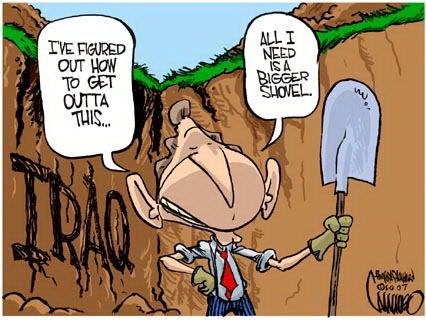(10 am. – promoted by ek hornbeck)
A number of economists predicted that the Iraq War would cause a financial crisis for the United States, even before it began.
In November of 2002, Yale University professor William Nordhaus was quoted in the Independent as warning that:
“A war in Iraq could cost the United States hundreds of billions of dollars, play havoc with an already depressed economy and tip the world into recession because of the adverse effect on oil prices, inflation and interest rates.”
On the day that Bush began his bombing of Baghdad, a.k.a “Shock and Awe,” March 20, 2003, CBS Market Watch predicted that,
“If war with Iraq drags on longer than a few weeks or months most are predicting, corporate revenues will be flat for the coming year and will put the U.S. economy at risk of recession, according to a poll of chief financial officers.”
GWB & deregulation: a lethal cocktail. It has brought us to this point as only he can spend over $12,000,000,000 every month on democratizing Iraq. The rest of us will have to pay for the rest of our lives before our kids take over the debts, as will the next generation.
Cross-posted on the Big Orange & La Vida Locavore.
Earlier this year Nobel Prize winning economist and former Clinton advisor Joseph Stiglitz, in an interview published in the Australian News, stated,
“The Iraq War has cost the U.S. 50-60 times more than the Bush Administration predicted and was a central cause of the sub-prime banking crisis threatening the world economy.”
The public had been encouraged by the White House to ignore the costs of the war because of the belief that the war would somehow pay for itself or be paid for by Iraqi oil or US allies.
When the Bush administration went to war in Iraq it obviously didn’t focus very much on the cost. If you recall, Larry Lindsey, then the chief economic adviser, said the cost was going to be between $US 100 billion and $US 200 billion. Donald Rumsfeld responded and said ‘baloney’, and the number the administration came up with was $US 50 to $US 60 billion, a bargain war! Lindsey was summarily dispatched to the dustbin of history.
Some have calculated that the cost is more like $US 3 trillion. And others have calculated that it is going to be a lot more.
Wapo’s article earlier this week didn’t mince words: Financial crisis dims Bush’s Iraq legacy. Legacy? What legacy? This financial mess we’ll all have to pay for?
Finally, this morning, someone on Bloomberg dared to utter the following words:
“This economic crisis can be attributed generously to the ever increasing cost of the Iraq war.”
Unfortunately I can’t remember his name but he’s a regular of Squawk Box, a daily business show I have been watching on a regular basis to try to fathom the depths of this economic crisis.
Throughout European business circles a tacit consensus has emerged: should McCain gain access of the White House, it’s curtains. There isn’t a single economist (save one from the FT) that has bought into his and Palin’s visions of the future.
And GWB? “We can solve this crisis and we will,” he bleated in extraordinarily brief remarks from the White House Rose Garden. Thank you, George, we owe you one!


9 comments
Skip to comment form
Nancy Pelosi and the democratic leadership have pushed through occupation funding bills for the past two years had no contributing effect, of course. She would have impeached Bush. If he had let her impeach him.
with that money here at home. Our investment has propelled the Iraqi stock market up 25% this year. They can’t trade electronically because the power doesn’t stay on all day, but still . . . it beats the hell out of what our stock market is doing. Maybe we should let Iraq invade us now so we can get our banks fixed. And our bridges. And our schools. And our slums.
Of course, not only Iraq should be on the walls.
story on Bush’s Rose Garden press conference today:
We cannot say that too much. We cannot explain it too often. And it’s also an explanation why the monetary policy moves the US is making don’t really make a lasting impact on credit or the markets. Put another way, the elephant is too small, and the hole is way too shallow.
takes on a whole different meaning these days.